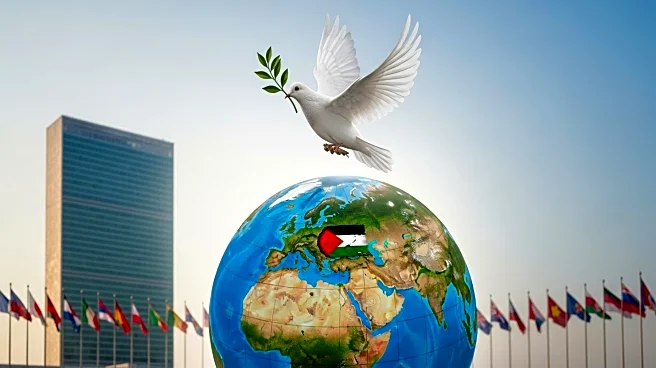What's Happening?
The United Nations is facing significant challenges in addressing the humanitarian crisis in Gaza, exacerbated by Israeli military actions. The US has consistently used its veto power at the UN Security Council to block resolutions aimed at establishing a ceasefire and ensuring unhindered access to aid for Palestinians. This has led to criticisms from legal experts and scholars who describe the situation as genocide. Historically, the UN has intervened in similar crises, such as the Suez Crisis in 1956, by deploying peacekeepers despite Security Council deadlock. However, current geopolitical dynamics, including US backing for Israel, complicate potential UN interventions in Gaza.
Why It's Important?
The ongoing crisis in Gaza has significant implications for international relations and humanitarian efforts. The US's support for Israel and its use of veto power at the UN Security Council highlight the complexities of international diplomacy and the limitations of the UN in preventing atrocities. The situation in Gaza is drawing parallels to past genocides, raising questions about the effectiveness of international bodies in safeguarding human rights. The inability of the UN to act decisively could lead to further humanitarian deterioration in Gaza, affecting thousands of civilians and potentially altering regional stability.
What's Next?
The UN General Assembly is expected to discuss the situation in Gaza, with France and Saudi Arabia pushing for recognition of a Palestinian state. However, the threat of US vetoes in the Security Council remains a significant barrier to concrete action. The divided stance among UN member states further complicates efforts to address the crisis. Without intervention from major powers, the UN's ability to respond effectively to the situation in Gaza remains uncertain.
Beyond the Headlines
The crisis in Gaza underscores the ethical and legal challenges faced by international organizations in preventing genocide. The role of powerful nations, such as the US, in influencing UN actions raises questions about the balance of power and the moral responsibilities of member states. The situation also highlights the need for reform within the UN to enhance its ability to respond to humanitarian crises without being hindered by political interests.











